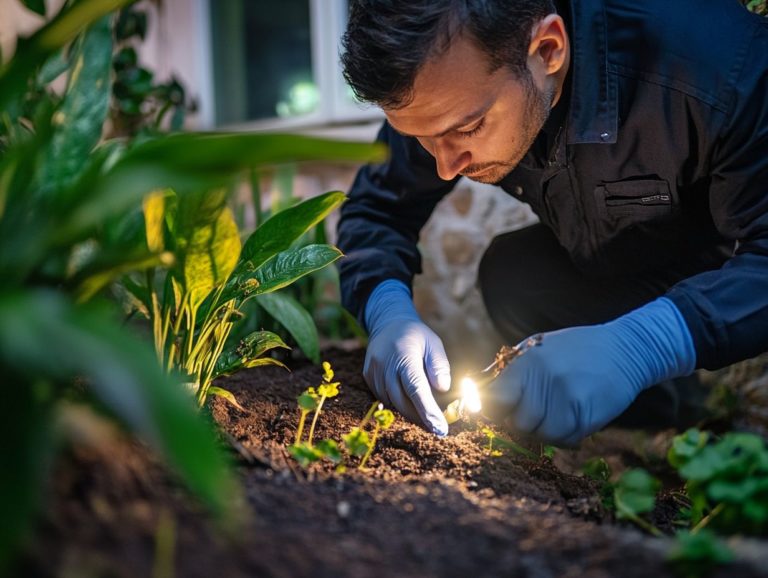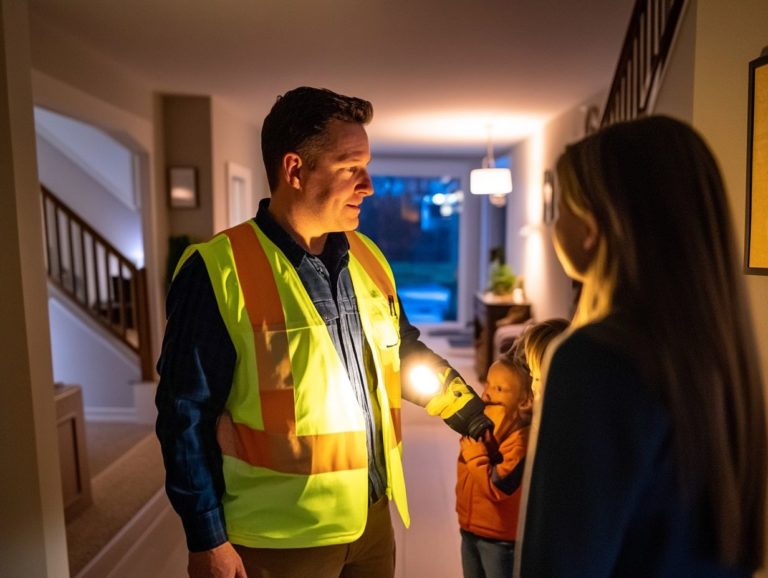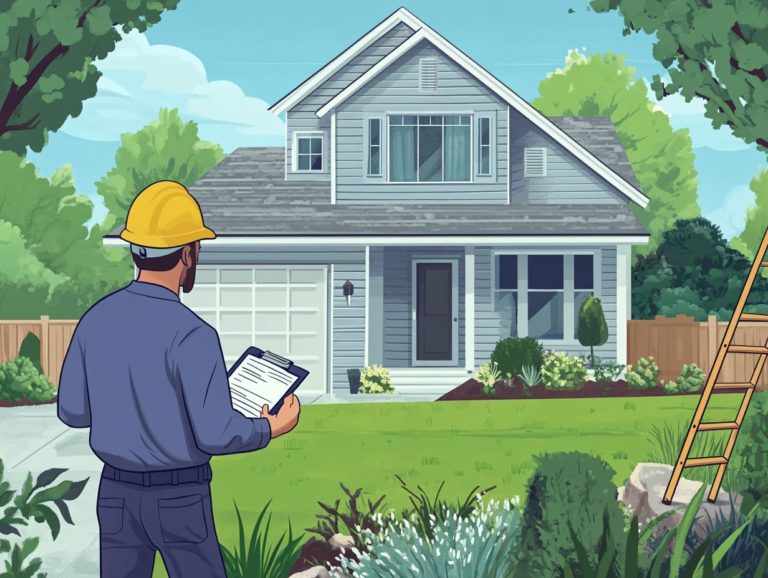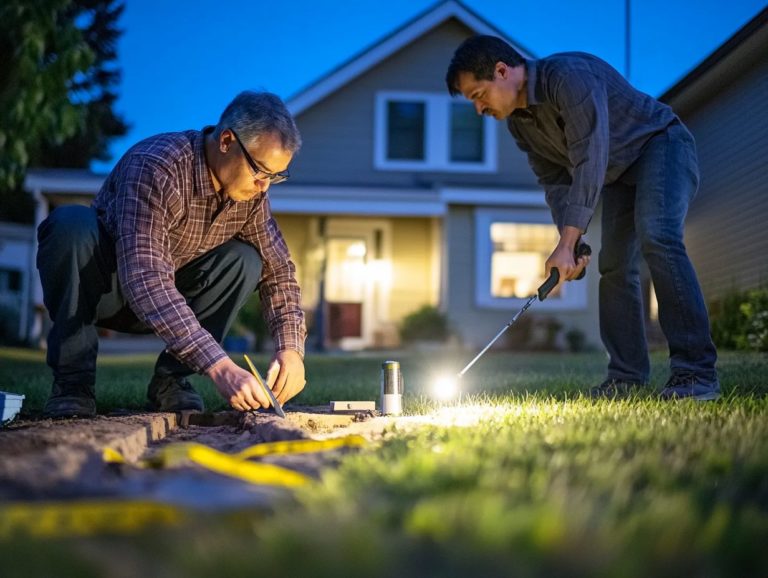How to Prepare for a Home Inspection
A home inspection is an essential milestone in your home buying or selling journey, offering valuable insights into the property’s condition while helping you sidestep potential surprises.
You might be wondering what exactly unfolds during a home inspection and how you can prepare yourself for it effectively.
This guide will delve into the purpose of a home inspection, outline what you can expect during the process, and provide tips to ensure a seamless experience.
Whether you find yourself on the buying or selling side, grasping these key elements can profoundly impact your real estate venture.
Continue reading to discover how to navigate this crucial procedure with assurance.
Contents
- Key Takeaways:
- Understanding the Purpose of a Home Inspection
- Preparing for a Home Inspection
- What to Expect During a Home Inspection
- Interpreting the Results of a Home Inspection
- Tips for a Successful Home Inspection
- Frequently Asked Questions
- Q1: What is a home inspection and why is it necessary?
- Q2: How far in advance should I prepare for a home inspection?
- Q3: What are some important areas to focus on when preparing for a home inspection?
- Q4: Should I attend the home inspection?
- Q5: Can I do anything to prepare for the home inspection on my own?
- Q6: What if the home inspection reveals major issues?
Key Takeaways:

- Understand why a home inspection matters.
- Prepare by fixing problems and decluttering.
- Know what inspectors will check.
Understanding the Purpose of a Home Inspection
A home inspection stands as a pivotal step in both the buying and selling journeys. It offers a detailed evaluation of a property’s condition through the expertise of a professional inspector.
This careful check encompasses essential aspects such as structure, safety, and possible big problems that could impact the property’s value.
For you, as a prospective buyer, grasping the insights provided in the inspection report is vital. It enables you to make informed decisions, address any concerns that may arise, and negotiate necessary repairs with confidence.
What is a Home Inspection and Why is it Important?
A home inspection is a careful check of a property’s overall condition, carried out by a qualified inspector who is dedicated to uncovering any existing or potential issues. This essential evaluation provides you with critical insights that can significantly sway real estate transactions.
For buyers, this inspection reveals vital information regarding the structure, electrical systems, plumbing, and general maintenance of the property. Using this knowledge, you’re enabled to make informed decisions and negotiate more favorable terms.
On the flip side, sellers also reap the benefits. By proactively seeking an inspection, they can tackle hidden problems before listing, thereby enhancing the property s appeal and market value.
In essence, a comprehensive home inspection not only promotes transparency but also instills confidence in both buyers and sellers, paving the way for smoother transactions.
Preparing for a Home Inspection
Preparing for a home inspection requires a thoughtful approach that both sellers and buyers should embrace to ensure the process is seamless. Learning how to prepare for a successful home inspection will help accurately assess the property’s condition.
This preparation entails addressing essential maintenance tasks, such as cosmetic repairs, making sure utilities are connected, and following tips for a successful home inspection day, by adhering to a comprehensive inspection checklist.
Cleaning and decluttering your home can greatly improve the overall impression, allowing for a meticulous visual inspection that leaves no stone unturned.
Making Necessary Repairs and Improvements
Addressing necessary repairs and improvements is crucial before a home inspection, as it can significantly influence the inspection results and shape the perceptions of potential buyers. For valuable insights, check out how to prepare for a home inspection as a buyer.
By taking the time to tackle both major and minor repairs, you elevate the overall appeal of your property and foster trust with prospective buyers. Issues like leaky faucets, peeling paint, or squeaky doors, although they may seem trivial, can raise concerns during the inspection process.
Creating a checklist that includes cosmetic enhancements such as refreshing the landscaping or depersonalizing rooms can greatly enhance your home’s visual allure and create a welcoming atmosphere.
By staying organized with a detailed inspection checklist, you can systematically address each area of concern, ensuring that no crucial details slip through the cracks. This proactive approach not only streamlines the selling process but may also lead to higher offer prices.
Cleaning and Decluttering the Home
Cleaning and decluttering your home before a home inspection is crucial. It helps create a positive first impression on prospective buyers and ensures a thorough inspection process. For detailed advice, check out this guide on how to prepare for a home inspection.
A well-organized space showcases the property s best features. It also enables inspectors to assess its condition more effectively.
Start by tackling one room at a time. This approach makes it easier to manage the many items that tend to accumulate over the years.
Consider using the four-box method: label boxes for keeping, donating, recycling, and trash. This strategy helps you make quick decisions about what to part with.
A clean environment can significantly reduce stress. This allows you to focus on the essential aspects of the sale while presenting an inviting atmosphere that encourages buyers to envision themselves living there.
Gathering Important Documents and Information
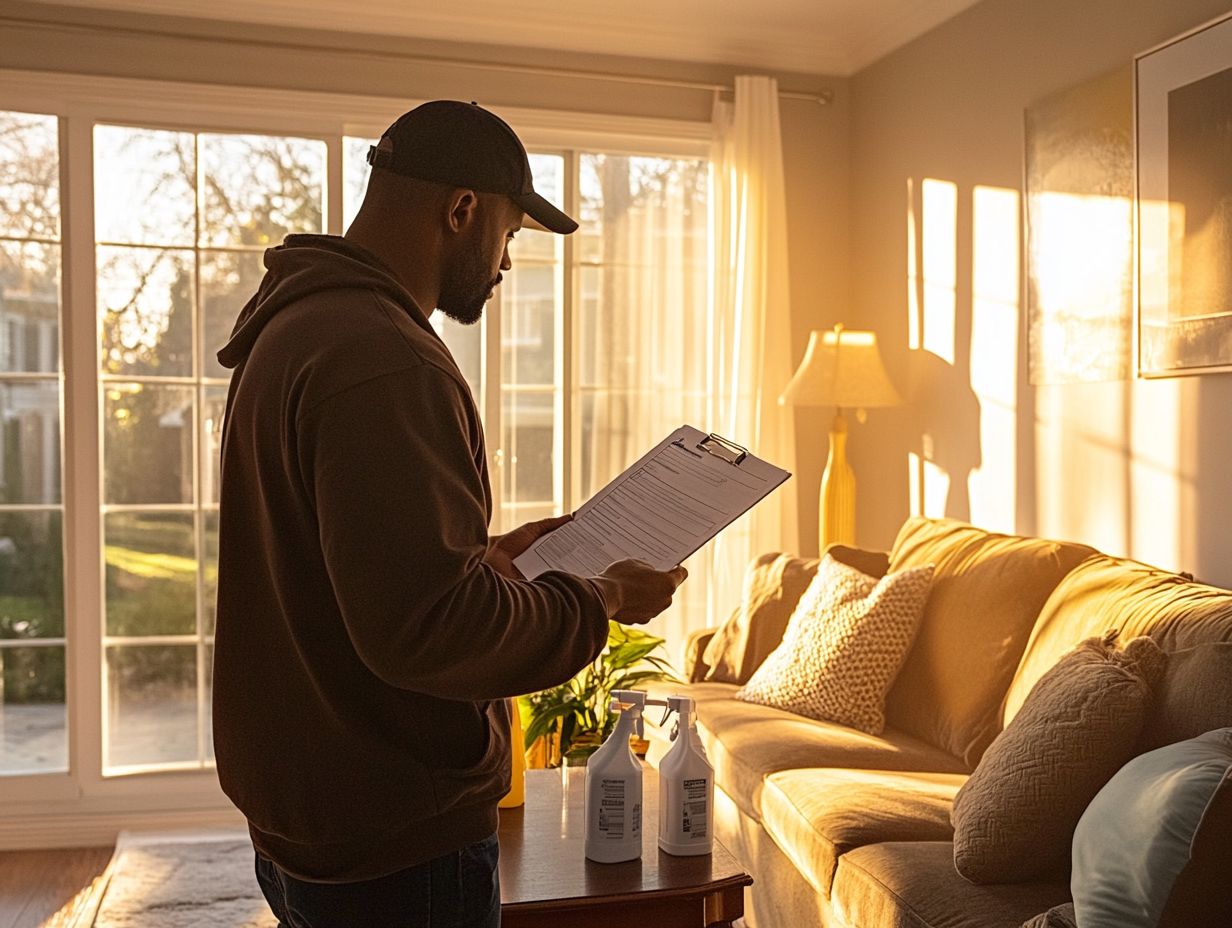
Gathering essential documents and information is a crucial step in preparing for a home inspection. Understanding what to expect with a home inspection offers the inspector valuable insight into your property’s history and maintenance.
Having a complete set of documents can significantly streamline the inspection process.
Key records to gather include:
- Maintenance logs detailing repairs and improvements you’ve made.
- Utility information, such as past bills and usage patterns, which can highlight efficiency or potential issues.
- Warranties for appliances and systems.
- Permits for any renovations you’ve undertaken.
To enhance your organization, create a dedicated folder, both digital and physical, to store these documents. This proactive strategy facilitates a smoother review of your home s condition by the inspector.
It also instills confidence in potential buyers who appreciate your due diligence.
What to Expect During a Home Inspection
Understanding what to expect during a home inspection can ease your concerns as a buyer. This ensures that every critical aspect of the home receives a thorough evaluation by the inspector.
Get ready for a meticulous visual inspection covering everything from the foundation to the roof. This includes an in-depth examination of key systems such as the HVAC (Heating, Ventilation, and Air Conditioning), electrical boxes, and plumbing.
Process and Timeline
The home inspection process unfolds in a structured manner, starting with the arrival of the home inspector. They will introduce themselves to you, the homeowner or seller.
This initial meeting lasts about 10 to 15 minutes and sets the tone for what s to come. It allows the inspector to gather essential information about your property.
After this introduction, the actual inspection begins. This typically takes 2 to 3 hours, depending on the size and complexity of your home.
During this time, the inspector meticulously assesses vital areas like the roof, plumbing, electrical systems, and foundation.
After the physical inspection, expect a detailed report within 24 to 48 hours. This report summarizes the findings, highlights any potential issues, and suggests necessary repairs.
This thorough approach ensures you have a comprehensive understanding of your prospective home s condition, enabling you to make informed decisions.
Areas of the Home that Will Be Evaluated
During a home inspection, expect a thorough evaluation of various key areas to determine the overall condition of the property. This encompasses both the interior and exterior components of the home.
The inspector will carefully examine the HVAC system to ensure it operates efficiently. They will also check for any signs of wear or malfunction.
Plumbing is another critical focus; leaks, water pressure, and drainage systems will be scrutinized to prevent future headaches.
Electrical systems will be assessed, with a keen eye on wiring integrity and functionality, as well as essential safety features like grounding and circuit breaker performance.
The inspector will also test safety components like smoke detectors and carbon monoxide sensors. This ensures they meet current safety standards and provides peace of mind as a prospective homeowner.
Interpreting the Results of a Home Inspection
Interpreting the results of a home inspection is vital for you, whether you’re buying or selling. This process offers critical insights into the property’s condition, highlighting necessary repairs that need attention.
Understanding these details enables you to make informed decisions. This ensures a smoother transaction and safeguards your investment.
Understanding the Inspection Report
The inspection report is a comprehensive document that outlines the findings of the home inspector. It details both significant issues and minor repairs that may be required.
As a prospective buyer, analyze this report carefully. Focus on key sections that highlight critical concerns, such as the overall strength of the building, plumbing, and electrical systems.
These areas are crucial as they reveal potential liabilities that could impact the property’s value and safety. They also play a key role in your negotiations. Pay close attention to findings related to safety hazards these could justify a lower offer or prompt you to request repairs before finalizing the deal.
If you’re a seller, the report can help you identify upgrades or repairs that enhance your property’s appeal. By addressing these issues, you can position your home to attract serious offers while minimizing risks associated with hidden defects.
Addressing Issues Found

Addressing any issues uncovered during the home inspection is crucial for both sellers and buyers. It can significantly impact buyer concerns and shape the sale’s outcome.
For sellers, tackling concerns highlighted in the inspection report showcases commitment to transparency and builds buyer confidence. Assess both major and minor issues to determine which repairs require immediate attention.
This may mean hiring professionals for significant repairs, like structural or plumbing matters, while minor issues could be tackled with some DIY skills.
On the other hand, buyers benefit from clear communication about repair expectations. By presenting solid evidence from the inspection report, they can effectively negotiate repairs or request concessions, fostering a transparent dialogue. This paves the way for both parties to reach a satisfactory agreement.
Tips for a Successful Home Inspection
To achieve a successful home inspection, prepare thoroughly, communicate clearly with the inspector, and understand the process from both buyers’ and sellers’ perspectives.
This thoughtful approach enhances the inspection experience and enables you to navigate potential challenges confidently.
Communication with the Inspector
Effective communication with your home inspector is crucial for a successful inspection. It clarifies expectations and addresses immediate concerns that may arise during the evaluation.
To ensure everything flows smoothly, engage in open dialogue throughout the inspection. Asking relevant questions shows genuine interest and helps bring potential issues to light.
Understanding the inspector’s methodology and evaluation criteria enhances transparency. By being proactive in your communication, you foster an atmosphere that allows for a comprehensive assessment, leading to better decision-making regarding your real estate investment.
Being Present During the Inspection
Being present during the home inspection provides invaluable insights into the property’s condition. It allows you to address concerns directly with the inspector.
This presence fosters transparency and enables meaningful dialogue. You can ask questions that clarify various aspects of the house.
By observing the inspector, you can identify potential issues, such as roof wear or plumbing quirks. During this time, actively engage with the inspector ask for explanations about their findings and what those implications might mean.
This proactive approach transforms the inspection into a valuable learning experience, leading to better decision-making.
Following Up on Recommendations
Following up on the recommendations outlined in the inspection report is crucial for ensuring that any identified issues are addressed promptly and effectively.
Taking decisive action not only mitigates potential problems but also underscores your commitment to maintaining your property s integrity. By addressing repairs or necessary maintenance based on the inspector s findings, you can significantly boost buyer confidence and make your property far more appealing.
This proactive approach streamlines the transaction process and reduces the chances of negotiations stalling over unresolved concerns. Ultimately, adhering to the inspector’s suggestions establishes a solid foundation for a smoother sale, fostering trust and transparency between all parties involved, and potentially leading to a quicker and more favorable closing.
Frequently Asked Questions
Q1: What is a home inspection and why is it necessary?

A home inspection is a thorough evaluation of a property’s condition, typically done before its sale. It helps identify any potential problems or safety hazards within the home that may require repair or maintenance. This process gives you peace of mind and helps you make an informed decision about the property.
Q2: How far in advance should I prepare for a home inspection?
Start preparing now to ensure everything is ready at least a week before the scheduled date. This gives you enough time to address potential issues and ensures that your home is in its best possible condition. For detailed guidance, check out how to prepare for a home inspection.
Q3: What are some important areas to focus on when preparing for a home inspection?
Focus on the main parts of the building, like walls and the foundation, as well as the electrical and plumbing systems, heating and cooling systems, and the roof. Decluttering and deep cleaning are also essential, as is addressing any visible maintenance issues like peeling paint or leaky faucets.
Q4: Should I attend the home inspection?
It s highly recommended for you to attend the home inspection. This gives you the opportunity to ask questions and address any concerns you may have. It also allows you to gain a better understanding of your home’s condition and any issues that may arise during the inspection.
Q5: Can I do anything to prepare for the home inspection on my own?
Yes, there are several things you can do to help prepare for a home inspection. Change air filters, check and replace light bulbs, and make sure all smoke and carbon monoxide detectors are in working condition. Gather any necessary paperwork, like warranties or repair records, to provide to the inspector.
Q6: What if the home inspection reveals major issues?
If major issues are revealed during the home inspection, it s essential to address them as soon as possible. This may involve negotiating with the seller for repairs or credits or deciding to walk away from the sale. Carefully consider all options and consult with your real estate agent before making a decision.
Ready to get started? Schedule your home inspection today or contact your real estate agent for more guidance!

